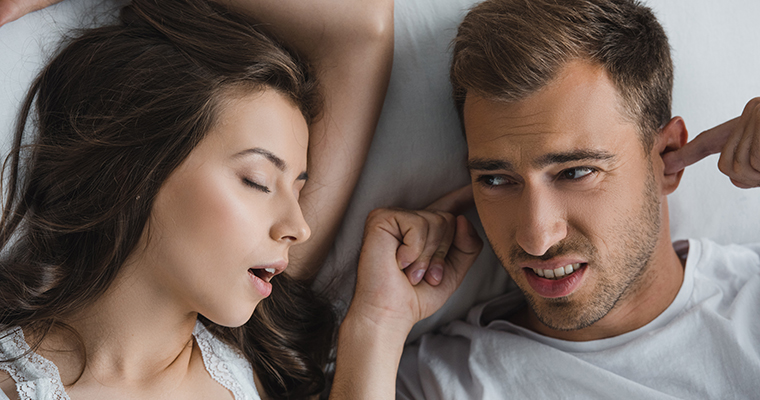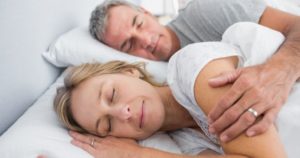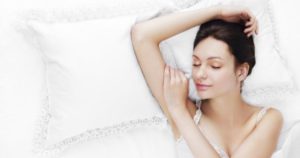10 FAQs about Sleep Apnea

Sleep apnea is one of the more common sleep-related disorders in America, with about 22 million people suffering moderate to severe symptoms.
Yet at the same time, many people are completely unaware that they have this condition – or that dentists can treat it!
There are two main types of sleep apnea: Central Sleep Apnea (CSA) and Obstructive Sleep Apnea (OSA). OSA is the more common of the two.
To help fill in the gaps about sleep apnea, we’ve put together a round-up of some of the most frequently asked questions on sleep apnea.
1. What causes sleep apnea?
Sleep apnea is a partial or complete stopping of breathing during sleep.
This causes the body to strain harder for oxygen and makes the brain send signals that jerk your body awake to resume proper breathing.
2. What is Obstructive Sleep Apnea?
Obstructive Sleep Apnea (OSA) is caused by intermittent relaxation of the throat muscles, blocking the airway while sleeping.
This relaxing results in shallow breaths and a brief stoppage of breathing while asleep.
The most common characteristic of OSA is snoring, which is often loud and persistent. The snoring sound is caused by air squeezing through the compressed airway.
3. What is Central Sleep Apnea?
With this variant of sleep apnea, breathing stops and repeatedly starts due to improper signaling from the brain.
Although the muscles that control breathing do not over-relax or obstruct the air path directly, they never receive appropriate signals from the brain, and consequently, breathing is disrupted.
4. What are the warning signs of sleep apnea?
The most common telltale sign of obstructive sleep apnea is loud snoring—loud enough to disturb the patient and others around, even through walls.
For more details, see our full breakdown of the warning signs of sleep apnea.
5. What can happen if sleep apnea goes untreated?
Sleep apnea side effects can disrupt your daily life and have an impact on your overall health and productivity. If left untreated, sleep apnea can lead to:
- Low energy and reduced productivity at work
- Irritability, anxiety, and mood swings
- Diabetes, due to an inability to regulate insulin
- Hypertension, as the heart exerts itself more to pump oxygen through the body at night
- Higher chances of stroke
- Increased risk of heart attacks (and increased lethality of cardiac arrest)
6. What is a sleep study, and can it be done at home?
A sleep study is a test designed for obstructive sleep apnea diagnosis and similar sleep disorders.
The test monitors and records:
- Sleep stages
- Heart rate
- Breathing
- Eye and leg movements
A test determines if you experience disrupted sleep patterns and pinpoints the cause.
A sleep apnea diagnosis can be made at home with a Home Sleep Test (HST) or at specialized labs, often known as sleep centers.
7. What is a CPAP machine, and how does it work?
CPAP therapy prevents your airway from collapsing while asleep.
A small box delivers air into your nose and mouth at a constant pressure using a tube and mask, helping maintain consistent airflow.
As a result, you’ll sleep better without waking up repeatedly, all while snoring less.
8. Are there alternatives to CPAP?
Yes, there are two main alternatives; MAD and TSD.
A Mandibular Advancement Device (MAD) connects to the upper and lower teeth to advance or move the jaw forward.
A Tongue-Stabilizing Device (TSD) pulls the tongue forward using suction. The tip of the tongue then sits in a plastic bulb, protruding through the lips.
9. Can a dentist diagnose sleep apnea?
No, we cannot make a formal diagnosis. But we can:
- Recognize common signs of sleep apnea, which often manifest in the teeth and jaw
- Gather more information on your potential sleep apnea symptoms
- Communicate with your primary care physician to ensure you receive proper care
Then, according to any diagnosis and sleep apnea treatment recommendations, Dr. Eric Farmer may prescribe an oral sleep appliance to help.
10. If I snore, do I have sleep apnea?
Although snoring is not a sleep disorder in and of itself, it is often a sign of Obstructive Sleep Apnea.
If you are concerned about your sleeping patterns, contact Dr. Farmer for a consultation today.
Or you can:
- Call us at (316) 722-1110
- Email us at appointments@dentistswichita.com
Dr. Eric S. Farmer DDS is located in Wichita, KS, and proudly serves surrounding communities, including Maize and Valley Center, KS.


